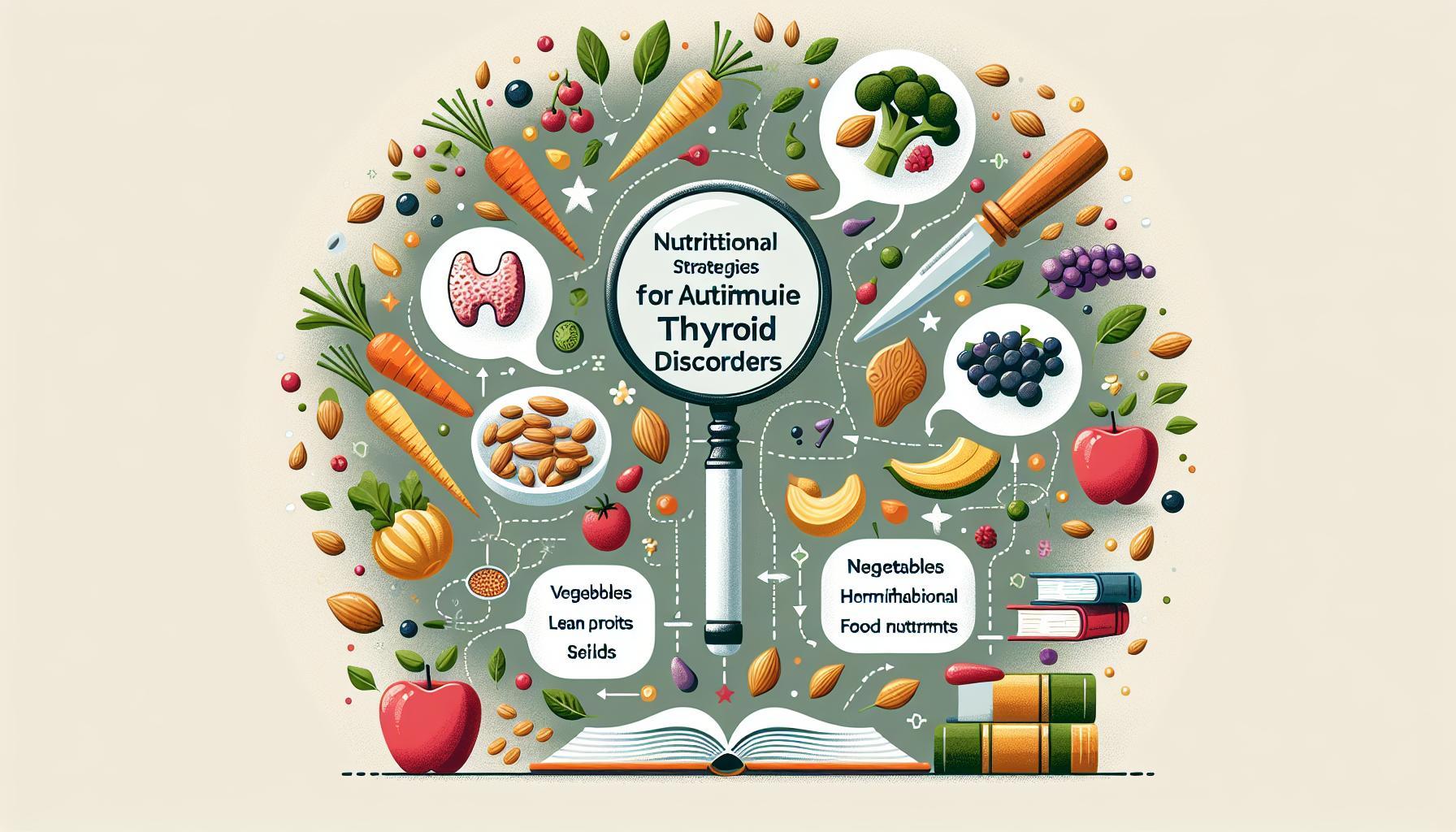If you’re one of the many people living with an autoimmune thyroid disorder, there’s a good chance you’re hoping to find effective nutritional strategies to help manage your condition. With terms such as “Gluten and Autoimmune Thyroid Conditions”, “Anti-Inflammatory Diet for Thyroid Health”, and “Foods High in Vitamin D for Thyroid Health” frequently making their way into conversations around thyroids and nutrition, it’s clear that diet plays a crucial role in this health area. Our post, “Nutritional Strategies for Autoimmune Thyroid Disorders”, will illuminate the relationship between diet and thyroid health, revealing how certain foods can aid in managing these disorders.
The Link Between Diet and Thyroid Health
Our diet significantly affects every aspect of our body, including the thyroid gland, a key player in metabolic regulation. What we eat can either support or impair thyroid function, especially in people with thyroid disorders. This section emphasizes the connection between nutritional choices and thyroid health, underscoring the importance of a balanced diet for maintaining optimal thyroid function.
Inflammatory Foods and Thyroid Disorders
Foods high in sugars, trans fats, and heavily processed ingredients are known to provoke inflammatory responses in the body. This inflammation can directly impact the thyroid by disrupting its function and exacerbating symptoms of thyroid disorders. Reducing consumption of these foods can help manage inflammation and support thyroid health.
Gluten-Free Diet For Autoimmune Thyroid Conditions
Many individuals with autoimmune thyroid disorders, such as Hashimoto’s thyroiditis, may find that a gluten-free diet helps alleviate their symptoms. Gluten can contribute to inflammation and immune system dysfunction, which can worsen autoimmune conditions affecting the thyroid.
Gluten, Inflammation, and the Thyroid
The relationship between gluten and inflammation is particularly critical in the context of thyroid health. Gluten can trigger an inflammatory response that exacerbates symptoms associated with thyroid diseases, and in some cases, may lead to further autoimmune reactions in genetically predisposed individuals.
Anti-Inflammatory Foods for Thyroid Health
Integrating anti-inflammatory foods into the diet is beneficial for managing and reducing the symptoms of thyroid disorders. Foods that combat inflammation can help regulate thyroid function and decrease the severity of symptoms.
Key Components of an Anti-Inflammatory Diet
The anti-inflammatory diet focuses on foods that help reduce systemic inflammation. Key components include olive oil, which is rich in oleic acid, green leafy vegetables that are high in antioxidants, nuts which provide healthy fats, fatty fish like salmon rich in omega-3 fatty acids, and berries and citrus fruits known for their high vitamin C content. These foods collectively support immune system regulation and can aid in maintaining thyroid health.
The Essential Role of Vitamin D in Thyroid Health
Vitamin D plays a crucial role in immune regulation and cellular function, including the cells of the thyroid gland. Adequate levels of vitamin D are essential for proper thyroid function and can help prevent autoimmune thyroid disorders.
Foods Rich in Vitamin D for Thyroid Health
Foods that are high in Vitamin D include fatty fishes like mackerel and salmon, fortified dairy products, and egg yolks. These can be crucial in a diet aimed at boosting Vitamin D intake to support thyroid health.
Detrimental Foods for Thyroid Health
Certain foods might be generally considered healthy but can adversely affect thyroid health. This includes foods that interfere with thyroid hormone production or absorption.
The Impact of Soy on Thyroid Health
Soy contains isoflavones, which can act as goitrogens—substances that disrupt thyroid production by interfering with iodine uptake in the thyroid gland. Soy can also hinder the absorption of thyroid medications, making it necessary for individuals with thyroid issues to moderate their soy intake.
Personalizing Your Nutritional Strategy
Managing autoimmune thyroid disorders requires a personalized approach, as dietary needs can vary greatly from one person to another. It’s important to consider individual nutritional requirements, symptoms, and lifestyle factors.
The Value of a Dietitian for Thyroid Disorders
Consulting with a registered dietitian can be invaluable for individuals with thyroid disorders. A dietitian can help tailor a dietary plan that addresses specific health needs, optimizes thyroid function, and improves overall well-being.
Conclusion
Embracing nutritional strategies for autoimmune thyroid disorders is an empowering step towards managing your health. By implementing beneficial dietary changes such as a gluten-free approach, an anti-inflammatory diet, and incorporating vitamin D-rich foods, you can support your thyroid health while also avoiding potential trigger foods.
Frequently Asked Questions
1. Are there specific foods I should avoid with an autoimmune thyroid disorder?
Foods high in soy and gluten can potentially negatively affect thyroid health.
2. How does Vitamin D support thyroid health?
Vitamin D supports thyroid function by regulating the immune system and reducing inflammation.
3. Can a gluten-free diet help an autoimmune thyroid disorder?
Yes, gluten can trigger inflammation which can worsen thyroid symptoms.
4. Can diet alone cure an autoimmune thyroid disorder?
While diet plays a significant role in managing symptoms, it’s important to consult your healthcare provider for a comprehensive treatment plan.
5. Is an anti-inflammatory diet beneficial for all types of thyroid disorders?
Yes, an anti-inflammatory diet can help manage symptoms for multiple thyroid disorders by reducing inflammation.










